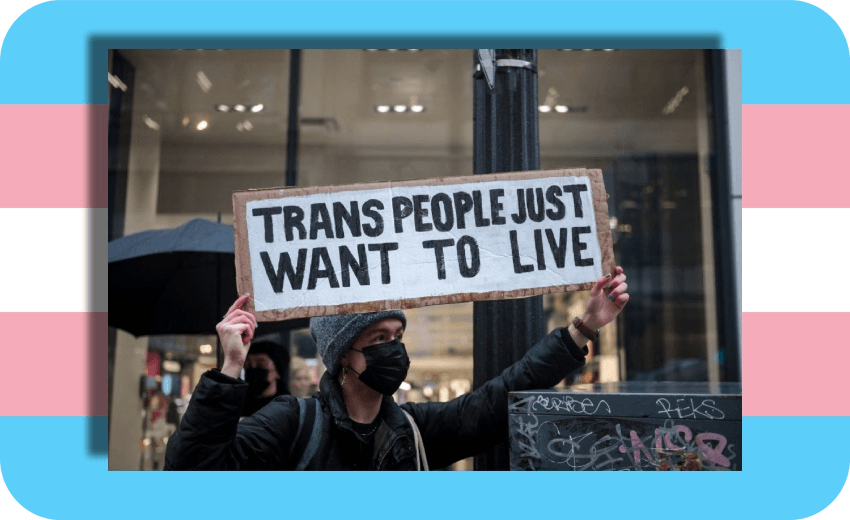When trans people are being targeted, the least the rest of us can do is lend some of our time, writes Mad Chapman.
Everyone has causes they’re passionate about. For some it’s climate action or the environment. For many it’s indigenous rights. For others it’s legalising cannabis or euthanasia or abolishing prisons. Most of the time, we see others fighting hard for their cause and go “huh” and then carry on with our day. Or we feel inspired and join the movement. Or, if we’re truly passionate, we argue against it.
But imagine your deep passion being to fight against trans rights. (Note: “gender critical” campaigners will claim to be “pro-women” rather than anti-trans. But that requires a belief that trans women are not “real” women. And if you believe that, guess what, you’re definitely not pro-trans.)
For decades, women have fought for equal rights. Indigenous communities have fought for equal rights. The disabled community has fought for equal rights. The rainbow community has fought for equal rights. The uniting motivation behind all of these movements has been an attempt to level the playing field. In other words: we as a people are disadvantaged, at risk and have fewer opportunities and access to life necessities (whether that be homes, land, freedom, democracy, safety, independence or marriage).
It’s largely understood (though certainly not by everyone) that when marginalised groups ask for something, it’s an attempt to make their own lives safer and more fulfilled, and generally has nothing to do with anyone else.
But now we have the trans community saying we as a people are disadvantaged, at risk and have fewer opportunities and access to life necessities. And there are statistics to back that up. Transgender people are over four times more likely than cisgender people to be victims of violent crime; a 2019 survey conducted here in Aotearoa found that more than half of trans and non-binary respondents had considered suicide that year; one in five trans or non-binary people have experienced homelessness, with that number rising to one in four for non-European participants; while still under-reported, 327 trans people were murdered around the world as a result of anti-trans violence in 2022.
Those stats aren’t a magical result of people being trans, they’re a result of prejudice, bigotry and a lack of acceptance throughout society. So what do trans people want? Not to be hurt, firstly. And by the sounds of it, to be left alone to live their ordinary lives with access to the care and support offered to everyone else.
And what are the likes of JK Rowling and Kellie-Jay Keen-Minshull saying in response? “No, you can’t do that.” A trans woman wants to use the women’s bathroom in order to feel safe within the shocking statistics of violence against trans people? No, you can’t do that. A trans person wants to play sport alongside other people they identify with? No, you can’t do that. A trans woman wants to seek refuge from harm at a women’s refuge centre? No, you can’t do that. (That last example was specifically cited by a local anti-trans campaigner on RNZ this week as a reason women fear for their safety around trans women, despite the head New Zealand Women’s Refuge national collective, Ang Jury, telling RNZ in 2019 that transgender women have been cared for within refuge spaces for years without issue.)
What confuses me is people dedicating their lives to something that, were they to ignore it, their own lives would go on unchanged. What a waste of their time.
These people who go out of their way to target people who just want to be left alone claim they’re not “anti-trans”, they’re “pro-women”. They’re just concerned for the safety of women. But how does a genuine concern for women’s safety lead a group of neo-Nazis to stand alongside you? If you are really into something and then look up to see you’re surrounded by literal Nazis, you might want to pause and take stock.
Anti-trans sentiment is not new, but it has grown in its severity, which is genuinely dangerous for our trans communities here and abroad. It is also a massively wasteful use of time. A counter-protest is being organised for Saturday, when Keen-Minshull is expected to speak at a rally in Auckland. There is so much support from across the city, but what trans people would probably like to be doing on Saturday is literally anything other than arguing for their humanity.
Part of my job as an editor is to respond to complaints about articles we publish. Some are valid, some are valid and aggressively communicated, and some are nonsense.
Then there are the complaints whenever we write about anti-trans figures. A truly depressing amount of my time is spent responding to people complaining on behalf of JK Rowling. Imagine spending your time defending an anti-trans billionaire. Embarrassing! But I have to respond, and it makes me wonder how coverage in our media might have been different over the past 30 years if actually-marginalised groups had as much time to complain about sexist, racist, ableist coverage. Because when you know that writing about something will likely create a lot of hassle, it’s tempting to just avoid the topic the next time it surfaces and save yourself some time.
But time is something many of us do have, and it can be deployed against those determined to waste their lives making others miserable. I’m very aware that in writing this and in referencing the complaints, I am likely to receive many more. But I am a cis woman who is not the target of these people’s ignorant ire. I, and many others, have the time to waste. Our trans friends do not.

